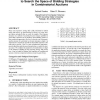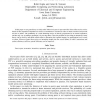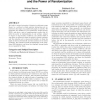ECAL
1999
Springer
13 years 8 months ago
1999
Springer
The “social dilemma” is a problem inherent in forming and maintaining cooperation among selfish individuals, and is of fundamental importance in the biological and social sci...
ATAL
2001
Springer
13 years 9 months ago
2001
Springer
In the last few years the use of coalition formation algorithms in multi-agent systems has been proposed as a possible way of modelling autonomous agent cooperation. Game theory pr...
CEEMAS
2003
Springer
13 years 9 months ago
2003
Springer
Modeling learning agents in the context of Multi-agent Systems requires an adequate understanding of their dynamic behaviour. Usually, these agents are modeled similar to the di�...
INFOCOM
2003
IEEE
13 years 9 months ago
2003
IEEE
— This paper analyzes a communication network with heterogeneous customers. We investigate priority queueing as a way to differentiate between these users. Customers join the net...
CODES
2003
IEEE
13 years 9 months ago
2003
IEEE
In this paper, we describe a new methodology based on game theory for minimizing the average power of a circuit during scheduling in behavioral synthesis. The problem of schedulin...
SAC
2004
ACM
13 years 10 months ago
2004
ACM
We study two properties of coalition formation algorithms, very important for their application in real-life scenarios: robustness and tolerance to some agent misbehaviors. The st...
GECCO
2005
Springer
13 years 10 months ago
2005
Springer
Many non-cooperative settings that could potentially be studied using game theory are characterized by having very large strategy spaces and payoffs that are costly to compute. Be...
ICPADS
2005
IEEE
13 years 10 months ago
2005
IEEE
In this paper we use game theory to study nodes’ behavior in peer-to-peer networks when nodes receive service based on their reputation. Reputation is used as a mechanism to inc...
SIGECOM
2006
ACM
13 years 10 months ago
2006
ACM
In traditional game theory, players are typically endowed with exogenously given knowledge of the structure of the game—either full omniscient knowledge or partial but fixed in...
SIGECOM
2006
ACM
13 years 10 months ago
2006
ACM
We study a natural extension of classical evolutionary game theory to a setting in which pairwise interactions are restricted to the edges of an undirected graph or network. We ge...







